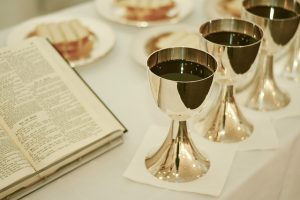
We are reflecting on the five Christian practices that are always successful—always honored by God:
- Anointing the sick,
- Serving of Holy Communion,
- Reading from the Bible,
- Laying hands on those who are set apart for a task, and
Last week we talked about anointing the sick as part of the gospel message. Let’s focus our discussion today on the serving of Holy Communion.
Holy Communion was instituted by our Lord during the last supper he had with his disciples. This is why Holy Communion is also called the Lord’s Supper/the Last Supper, or the Eucharist (from the Greek word for thanksgiving). Jesus said to his disciples: “I have wanted so much to eat this Passover meal with you before I suffer!” (Lk 22:15 Good News Translation).
Paul conveys the words of the Lord so beautifully in 1 Corinthians 11:23-26:
For I received from the Lord what I also passed on to you: The Lord Jesus, on the night he was betrayed, took bread, and when he had given thanks, he broke it and said, ‘This is my body, which is for you; do this in remembrance of me.’
In the same way, after supper he took the cup, saying, ‘This cup is the new covenant in my blood; do this, whenever you drink it, in remembrance of me.’ For whenever you eat this bread and drink this cup, you proclaim the Lord’s death until he comes.
The early Christians took these words of the Lord seriously. Acts 2:42 states that the believers “devoted themselves to the apostles’ teaching and to fellowship, to the breaking of bread and to prayer” (NIV). When the early church ate together, they also celebrated communion. The New Living Translation says it so well: “All the believers devoted themselves to the apostles’ teaching, and to fellowship, and to sharing in meals (including the Lord’s Supper), and to prayer.”
Jesus promised that in the elements of bread and wine he would be in the midst of his followers. That is why the early church celebrated holy communion every time they met! Although Calvin supported this practice, many churches of the reformation celebrate the Lord’s Supper much less—some only four times a year, but many monthly. The reason is that they want to treat Holy Communion with the reverence it deserves.
I believe that we should rediscover the wonder of the Lord’s presence as we celebrate the Lord’s Supper together. Let’s do it more often! Let’s celebrate the Lord’s Supper even in our homes as families! Let’s take the elements to those who are bedridden and infirm, and let’s expect the Lord’s real presence in our midst!
Have you experienced the Lord’s presence in a special way as you celebrated the Lord’s Supper? Please share with us!
